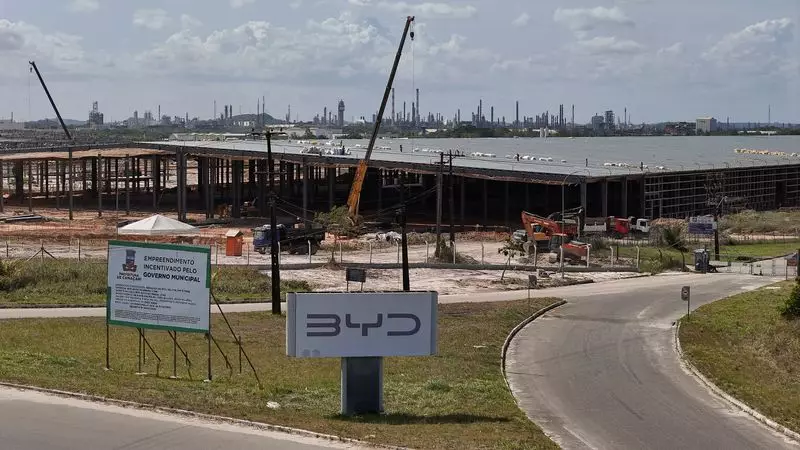In recent news, the Chinese electric vehicle manufacturer BYD (SZ:002594) has found itself embroiled in a significant labor dispute regarding the employment practices of foreign workers in Brazil. A key labor inspector revealed to Reuters that BYD utilized irregular visas for hundreds of Chinese workers to establish a factory in the northeastern state of Bahia. The startling nature of this revelation led to an investigation by labor authorities, culminating in a report that highlighted severe labor violations among the workforce, characterized as “slavery-like conditions.” Disturbingly, 163 of these workers were reportedly rescued last month, highlighting a troubling situation that underscores the long-standing issue of labor rights in multinational corporations.
The labor authorities’ investigation uncovered egregious violations that have drawn public ire and raised serious questions about BYD’s operational ethics. Labor inspector Liane Durao emphasized the irregularity of the labor conditions and asserted that BYD could face substantial fines for each worker found in exploitative conditions. Although BYD has pledged compliance with local labor laws for the remaining workers, skepticism remains about the sincerity of these commitments. With approximately 500 Chinese workers brought to the country, it raises a larger question about the overall integrity of BYD’s labor practices in foreign markets.
This issue is compounded by BYD’s relationship with Jinjiang, a contractor that allegedly played a significant role in these labor violations. Despite BYD’s claims of terminating ties with Jinjiang, the latter continues to dispute allegations made by Brazilian authorities, bringing to the forefront complex dynamics in global labor relations.
BYD’s factory in Bahia is not merely an isolated endeavor; it forms a part of the company’s larger strategy to expand its influence beyond China. As BYD moves to produce up to 150,000 vehicles annually, Brazil has become a crucial market, accounting for nearly 20% of its overseas sales in the first eleven months of 2024. The company has invested $620 million into the Bahia facility, signifying its strategic importance.
However, this significant investment may face setbacks owing to the investigations into labor practices. The recent probes not only jeopardize operational timelines but also pose a risk of backlash against BYD’s brand as it seeks to solidify its global foothold. The findings prompted the Brazilian government to suspend the issuance of temporary visas to workers affiliated with BYD, indicating a broader regulatory crackdown on multinational labor practices.
The revelations surrounding labor conditions may reverberate beyond just BYD, posing potential ramifications for diplomatic and economic relations between Brazil and China. The Brazilian government, particularly under President Luiz Inacio Lula da Silva, has emphasized the creation of local jobs as a priority. The importation of foreign labor is at odds with these objectives and could strain the goodwill necessary for fostering further Chinese investments in key sectors.
Yet, the relationship is nuanced; Brazil seeks to attract more foreign investment from China, historically one of its largest trading partners. This contradiction presents a daunting challenge for both countries as they negotiate the complexities of labor rights amidst economic ambitions.
As labor inspectors remain vigilant at BYD’s construction sites in Bahia, the ongoing scrutiny underscores an imperative for multinational corporations. Companies operating in foreign markets must navigate not just financial investment but also adhere to stringent ethical labor standards that respect workers’ rights. The BYD saga serves as a cautionary tale, illustrating the potential fallout when profit motives overshadow labor ethics. Moving forward, it highlights an urgent need for enhanced oversight and a commitment to responsible labor practices—essential for ensuring that globalization delivers true benefits to all stakeholders involved.

